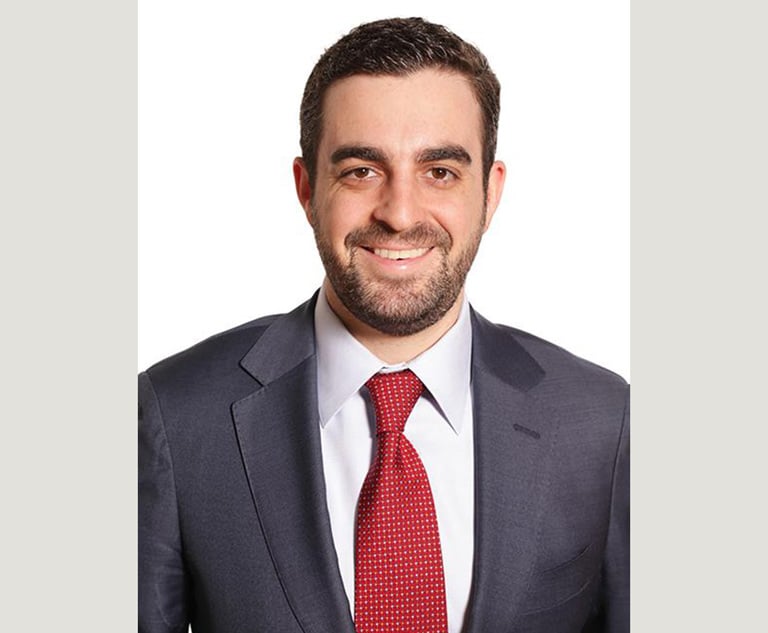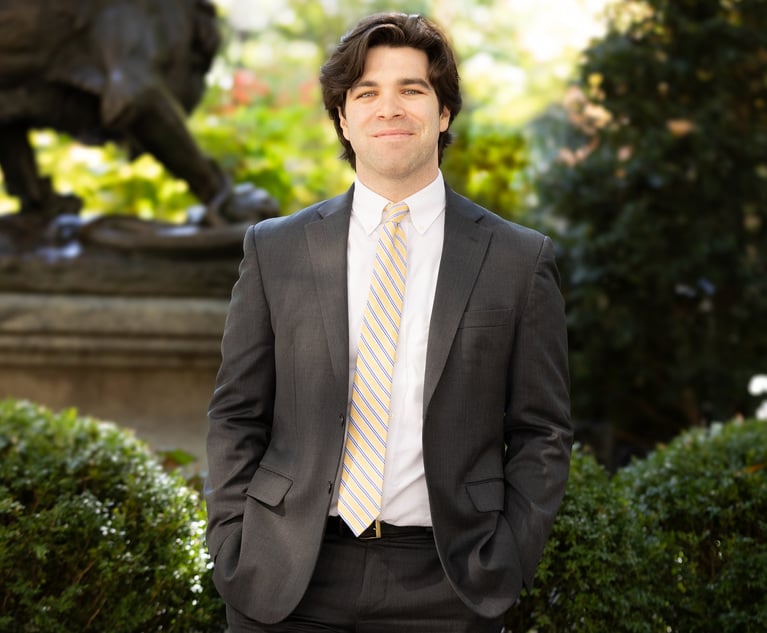 Photo: Thanwarat Tangthawilap/Shutterstock.com
Photo: Thanwarat Tangthawilap/Shutterstock.comIn Fight Over Nanny Cam Footage, Pa. Justices to Wrestle With Privacy Under Wiretap Law
In a case that raises complex questions about where the expectation of privacy begins and ends, the Pennsylvania Supreme Court has agreed to hear arguments over whether the audio portion of a recording of a nanny's alleged child abuse captured by a hidden surveillance camera in the home where she worked is admissible under the state's wiretap statute.
September 12, 2019 at 01:33 PM
6 minute read
In a case that raises complex questions about where the expectation of privacy begins and ends, the Pennsylvania Supreme Court has agreed to hear arguments over whether the audio portion of a recording of a nanny's alleged child abuse captured by a hidden surveillance camera in the home where she worked is admissible under the state's wiretap statute.
In Commonwealth v. Mason, the Franklin County District Attorney's Office is appealing a March ruling by a divided three-judge panel of the state Superior Court that allowed into evidence video of defendant Beth Ann Mason allegedly assaulting children in her care, but barred the audio portion of the recording.
According to Senior Judge Dan Pellegrini's March 7 majority memorandum opinion, Mason worked as a nanny for Eric Valle's six children. After becoming suspicious, based on his own observations and on accounts relayed to him by his 3-year-old son, that Mason was physically assaulting the children, Valle installed a hidden camera in the children's bedroom.
The camera eventually captured audio and video footage of Mason yelling at one of the children, shoving her into a crib and allegedly striking the child several times. Valle gave the recording to the police and Mason was charged with aggravated assault, simple assault and child endangerment.
But Mason filed an omnibus pretrial motion arguing that the audio and video recording should be excluded from evidence because it was captured without her knowledge in violation of Section 5721.1(a) of the Wiretapping and Electronic Surveillance Control Act.
Franklin County Court of Common Pleas Jeremiah D. Zook agreed and barred the entire recording from evidence.
But on appeal, the Superior Court said the trial judge erred in excluding the video portion of the recording from evidence because the Wiretap Act defines "electronic communication" as "any transfer of signs, signals, writing, images, sounds, data or intelligence of any nature transmitted in whole or in part by a wire, radio, electromagnetic, photoelectronic or photo-optical system."
"The gist of Mason's argument is that her image was 'transferred' and/or 'transmitted' to Valle's video recording device," Pellegrini said. "However, under the above definition, the 'image' must be transferred or transmitted 'by a wire, a radio, electromagnetic, photoelectronic or photo-optical system.' Mason's image was not sent to the recording device by any of those types of systems, so her image was not an 'electronic communication' or the evidence derived therefrom. As such, Section 5721.1(a) of the Wiretap Act does not prohibit the video's disclosure at trial, and Section 5721.1(b) does not provide a vehicle for the video's exclusion."
Pellegrini said that holding was in line with rulings by the U.S. Court of Appeals for the First, Second, Fifth, Eighth, Ninth and Tenth circuits, as well as the Florida Fourth District Court of Appeal and the New Jersey Superior Court.
The Superior Court did, however, uphold the trial court's exclusion of the audio recording from evidence.
"To the extent that Valle's hidden recording device captured words which Mason uttered, the Wiretap Act clearly encompasses them," Pellegrini said, adding that nonverbal sounds on the recording are likewise prohibited because "the Wiretap Act provides that if an oral communication is rendered inadmissible, then so is the 'evidence derived therefrom.'"
"Also rendered inadmissible are the 'contents' of such a communication, which includes 'any information concerning the substance, purport, or meaning of that communication," Pellegrini said.
Pellegrini also said Mason had a reasonable expectation of privacy.
"The recording here took place inside a child's bedroom in Valle's home," Pellegrini said. "While in her capacity as a nanny, that area functioned as Mason's place of work, there is no evidence that Mason was ever told that she would be audio monitored. Objectively, the record does not suggest that she had any reason to think that any of her personal communications would be intercepted in the home."
Judge Mary Murray concurred in the result.
President Judge Jack Panella filed a concurring and dissenting opinion, agreeing that the video portion of the recording was admissible but arguing that Valle had reasonable suspicion of aggravated assault, which should have triggered the "crime exception" to the Wiretap Act.
"Here, based on the unexplained bruising, 'thumbing,' split lip, and other injuries to his children while in the charge of appellee, I would conclude Valle had ample, objective reasons to believe Ms. Mason was committing, had committed, or was about to commit a crime of violence, viz., aggravated assault," Panella said.
But Pellegrini responded in a footnote that the appeals court must "defer to the trial court's finding that the record was too vague as to the nature and extent of the injuries at the time of [the camera's] installation."
Panella also argued that Mason had no reasonable expectation of privacy.
"Mason was an employee, not a social guest," Panella said. "While the record is not explicitly clear on whether Mason was an overnight guest, the burden of establishing this fact fell on Mason. It is undisputed that the recording at issue took place in a bedroom in Valle's house where the children slept while in Mason's care. I am not prepared to hold that any adult, outside of their own home, has a reasonable expectation of privacy in an area where young children are sleeping."
But Pellegrini responded to that contention in another footnote by pointing to state appellate court rulings from California, Texas and Connecticut that have found that babysitters do have an expectation of privacy in the homes in which they work because they have the right to exclude others from the household.
In a one-page Sept. 10 order granting allocatur, the Pennsylvania Supreme Court agreed to consider two issues, as stated by the prosecutors: "Whether a babysitter has a reasonable expectation of privacy in the bedroom of a child she is caring for? (2) Whether the sounds resulting from a child being forcibly thrown into a crib and being beaten by [Mason] constitute 'oral communications' or 'evidence derived therefrom' under the Pennsylvania wiretap statute?"
Mason's attorney, David Erhard of Steve Rice Law in Gettysburg, said the case raises an important policy issue: "In this day and age, how much should you be able to record people without giving notice?"
Erhard added that clarity regarding what constitutes an "oral communication" under the wiretap statute will also be important for future cases.
Franklin County District Attorney Jonathan Faust could not be reached for comment.
This content has been archived. It is available through our partners, LexisNexis® and Bloomberg Law.
To view this content, please continue to their sites.
Not a Lexis Subscriber?
Subscribe Now
Not a Bloomberg Law Subscriber?
Subscribe Now
NOT FOR REPRINT
© 2024 ALM Global, LLC, All Rights Reserved. Request academic re-use from www.copyright.com. All other uses, submit a request to [email protected]. For more information visit Asset & Logo Licensing.
You Might Like
View All
Philadelphia Bar Association Executive Director Announces Retirement
3 minute read
Phila. Jury Hits Sig Sauer With $11M Verdict Over Alleged Gun Defect
3 minute read
Phila. Attorney Hit With 5-Year Suspension for Mismanaging Firm and Mishandling Cases
4 minute read
Trending Stories
- 1'It Refreshes Me': King & Spalding Privacy Leader Doubles as Equestrian Champ
- 2Class Action Filed Against Houston Health Savings Account Firm for Allegedly Confiscating Client Funds
- 3These 2 Lawyers Just Became Florida Judges
- 4'Disease-Causing Bacteria': Colgate and Tom’s of Maine Face Toothpaste Class Action
- 5Trump's SEC Overhaul: What It Means for Big Law Capital Markets, Crypto Work
Who Got The Work
Michael G. Bongiorno, Andrew Scott Dulberg and Elizabeth E. Driscoll from Wilmer Cutler Pickering Hale and Dorr have stepped in to represent Symbotic Inc., an A.I.-enabled technology platform that focuses on increasing supply chain efficiency, and other defendants in a pending shareholder derivative lawsuit. The case, filed Oct. 2 in Massachusetts District Court by the Brown Law Firm on behalf of Stephen Austen, accuses certain officers and directors of misleading investors in regard to Symbotic's potential for margin growth by failing to disclose that the company was not equipped to timely deploy its systems or manage expenses through project delays. The case, assigned to U.S. District Judge Nathaniel M. Gorton, is 1:24-cv-12522, Austen v. Cohen et al.
Who Got The Work
Edmund Polubinski and Marie Killmond of Davis Polk & Wardwell have entered appearances for data platform software development company MongoDB and other defendants in a pending shareholder derivative lawsuit. The action, filed Oct. 7 in New York Southern District Court by the Brown Law Firm, accuses the company's directors and/or officers of falsely expressing confidence in the company’s restructuring of its sales incentive plan and downplaying the severity of decreases in its upfront commitments. The case is 1:24-cv-07594, Roy v. Ittycheria et al.
Who Got The Work
Amy O. Bruchs and Kurt F. Ellison of Michael Best & Friedrich have entered appearances for Epic Systems Corp. in a pending employment discrimination lawsuit. The suit was filed Sept. 7 in Wisconsin Western District Court by Levine Eisberner LLC and Siri & Glimstad on behalf of a project manager who claims that he was wrongfully terminated after applying for a religious exemption to the defendant's COVID-19 vaccine mandate. The case, assigned to U.S. Magistrate Judge Anita Marie Boor, is 3:24-cv-00630, Secker, Nathan v. Epic Systems Corporation.
Who Got The Work
David X. Sullivan, Thomas J. Finn and Gregory A. Hall from McCarter & English have entered appearances for Sunrun Installation Services in a pending civil rights lawsuit. The complaint was filed Sept. 4 in Connecticut District Court by attorney Robert M. Berke on behalf of former employee George Edward Steins, who was arrested and charged with employing an unregistered home improvement salesperson. The complaint alleges that had Sunrun informed the Connecticut Department of Consumer Protection that the plaintiff's employment had ended in 2017 and that he no longer held Sunrun's home improvement contractor license, he would not have been hit with charges, which were dismissed in May 2024. The case, assigned to U.S. District Judge Jeffrey A. Meyer, is 3:24-cv-01423, Steins v. Sunrun, Inc. et al.
Who Got The Work
Greenberg Traurig shareholder Joshua L. Raskin has entered an appearance for boohoo.com UK Ltd. in a pending patent infringement lawsuit. The suit, filed Sept. 3 in Texas Eastern District Court by Rozier Hardt McDonough on behalf of Alto Dynamics, asserts five patents related to an online shopping platform. The case, assigned to U.S. District Judge Rodney Gilstrap, is 2:24-cv-00719, Alto Dynamics, LLC v. boohoo.com UK Limited.
Featured Firms
Law Offices of Gary Martin Hays & Associates, P.C.
(470) 294-1674
Law Offices of Mark E. Salomone
(857) 444-6468
Smith & Hassler
(713) 739-1250





